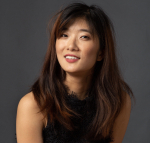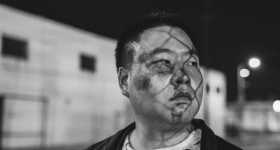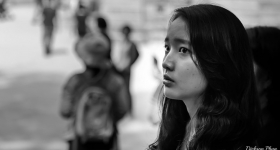Jane Pek’s debut novel, The Verifiers, follows Claudia, an investigator at Veracity, an online-dating detective agency. One of her clients leads her into a murder mystery. Angela Qian, fashion editor at Hyphen, sat down with the author to talk about the book, writing a mystery novel featuring a gay Asian female protagonist, dating platforms, data collection, Claudia’s family and Claudia's own view on relationships and love.
This interview has been edited for length and clarity.
Thank you for talking to us about this. I’m so glad I got to read The Verifiers. How did you begin writing this book?
Generally, when I write, I start out with a premise. So in this case, I started out with a premise of: what if there was an online dating detective agency in New York, and maybe they employed methods that were a little unconventional? And then the protagonist would be someone who was new to this agency, so that we could kind of understand this world through her eyes and from her perspective.
I wandered around the wilderness for a long time with this novel, because for the longest time, there wasn't a murder. It was more like there were smaller mysteries. And then the protagonist also actually became someone totally different. I only ended up with Claudia in the last iteration of the novel that I wrote before sending it to agents.
I’m curious, how did your character change from the first draft until Claudia?
When I started writing that story, I knew that I wanted the character to be a gay female. When I was growing up, and even in my 20s, there were hardly any books with [gay female] protagonists. I really wanted to write a novel which had that character be front and center. But then, because of that, I kind of hesitated about making her also Asian because I thought it might be a bit close to home. The protagonist actually used to be white.
I think I struggled with that because I just didn't really understand her family's situation. Then I changed the character to someone who was not just Asian but also a second-generation Asian immigrant.
I myself am first-generation, but I have a lot of second-generation immigrant friends. And I felt that if the protagonist was a first-generation immigrant, I would really have to explore the decision to come here, which ties back to another country. And I didn't want to have too much going on. So I made her a second-generation immigrant. I felt like I understood the type of family that she would have.
To dive into the family stuff — at the beginning of The Verifiers, Claudia is intrigued by these two sisters who come to the agency, Sarah and Iris. This leads her down a big path in the book. Her understanding comes a bit from her own family dynamic: Claudia has a brother and a sister but has a bit of a privileged position in the family, which her siblings resent her for. How did you kind of think through these family dynamics while you were plotting out the story?
I myself have two siblings, a brother and a sister, but I'm the oldest. I knew that I wanted two siblings because I really like that dynamic when you have three people. And I also wanted to make it not necessarily a warm and fuzzy kind of family. I wanted to get to the idea of their mother and how she's kind of disappointed with her life and how that, to some extent, translates into the ways that she interacts with her children. I wanted to write a really complicated mother character, maybe not the best mother, but there are really complex dynamics between her and her children.
I heard a quote at a recent AAWW (Asian American Writers' Workshop) event where Sequoia Nagamatsu said his characters didn't draw attention to their Asianness; they were simply allowed to exist and be, and I really liked that. The Verifiers is not very self-conscious about the Asian identity, and as you were saying, you didn’t want to explore reasons for emigrating or the difficulties of assimilation.
Yeah, I mean, I actually do really like that quote.
I would actually say that I've picked that approach with both the race issue and also the sexuality issue. I didn’t want this novel to be about what it means to be gay or what it means to be Asian, or what it means to be a gay Asian. It’s just the fact that Claudia is both gay and Asian, and she's living her life in New York. There are some ways the world is shaped by those traits of hers, but there isn’t a deep dive into what either of those two things mean.
Yeah, I found that really refreshing. For a lot of the Asian or Asian American literary canon, many of the iconic gay or queer writers, like Qiu Miaojin, seem to have a lot of suffering in their books. So it was just really nice to read about a happy, confident, gay Asian character.
I didn't really want to call attention to the fact that she was gay. I just wanted that to be part of the character, the same as how she works as an online-dating detective and she likes cycling and she likes reading mysteries.
Throughout the book, you have these Inspector Yuan references — a fictional series within the novel — which are the key to some of Claudia’s breakthroughs. I was wondering how you got the inspiration for those and built those out?
Yeah, those were really fun to write. With the Inspector Yuan references, I was poking a bit of fun at classic murder mystery tropes. Because it's kind of easy to make fun of them, like, from this footprint, you can know the culprit was 6 feet 4 inches tall and was left-handed and stuff like that. The Inspector Yuan references were an homage to those but also my way of making fun of them.
Also, I really like wuxia shows. And I thought it would be fun if I had wuxia detectives. As far as I know, that doesn’t exist in English. So I thought, well, I'll just put that in.
It also developed organically along the way. Claudia is an avid murder mystery reader, but I didn’t want to reference a real series to set the book in a particular time period. I thought, I'll just make up my own series.
Was this your first time writing a mystery novel? How did you approach plotting it?
Oh my gosh, yes, I would say that was the hardest part of the novel. My editor really helped, to go back to an earlier question that you had, in terms of linking the personal narrative with the murder narrative. Claudia’s particular relationship with one of her siblings caused her to realize something about the relationship between the victim and the victim’s sibling, which then led to further conclusions. But yeah, the plotting was definitely very hard for me.
Did the villain of the story ever change between drafts?
It did. In the original draft, I punted a bit more as to who the villain was and left the ending open for something bigger, with hints about the motives of anonymous corporations. But at the end of the day, someone had to take responsibility. It is people who are making these decisions and running corporations.
So that brings me to how so much of The Verifiers is also about corporations, data collection and consumer privacy, which is very relevant these days. Claudia is very skeptical of dating apps, and she doesn't really use them herself. Does this reflect your own views?
I actually met my partner, now my wife, on OkCupid. We kind of lucked out because she was the first person I met, and I was her first person. I have always had a positive experience with dating sites. Online dating allowed me to meet a wide range of people whom I would never have met otherwise. And even when we didn't hit it off in a romantic sense, it was just fun to have this two-hour conversation with someone and learn about them.
That is part of the appeal for Claudia as a verifier, which is that she gets to learn about these people and get a sense of their lives, which also fits with her as an avid fiction reader. But at the same time, when I wrote The Verifiers, I liked the idea of having a protagonist in a novel about online dating and not having a romance. I think also this allows her to be a verifier because her own profile is not online, so there’s no risk someone she is verifying could come across it.
One thing I wanted to raise is that generally, when we interact with technology, we provide a lot of data about ourselves. And we do it without really thinking because it makes our lives more convenient. And then at a certain point, it's almost like, there's no way you could go about your days without Google Maps and without Amazon and without Netflix. In terms of online dating with the world that I created, online dating is really driven by data and algorithms and all that.
Because romance is so essential, finding your significant other is so essential to our conceptions of what we want our lives to be. And in order to have the best match possible, you actually want to get out as much data as you can about yourself to get a more accurate result. I don't want to say that it's like, definitely bad or good, but I do think it's something worth thinking about in terms of what we put out there and what we get out of it.
The conclusion of the book definitely feeds into some deep fears people have. Without giving too much away, there are fears that still linger from the early days of the Internet of being lied to or having a false relationship with someone who’s not really presenting themselves accurately. And on the other hand, there are the fears about the roles of algorithms, technology, artificial intelligence.
Do you think The Verifiers is set in a near future? Or do you think that's a reality for us like today, in the current moment?
I really hope it is not the current moment. I saw it as in the near future. I don’t think that there are actually bots or algorithms out there trying to shape our relationship preferences.
But I do think that our tastes and preferences are being shaped by the technologies that we use right now, and have been for years. For example, at Amazon, when you search for something, they will give you a list. You probably click through the top 10 or 20, you'd never click all the way down to the thousands. And so how they rank things will determine how you make your decision. And based on how you make that decision, they will give you recommendations. And so if you follow those recommendations, then you make more decisions. And all of those decisions are shaped by what they choose to show you or not show you in the first place. So I think in that respect, we are definitely being shaped in terms of what we choose to watch and what we choose to eat and what we choose to buy and probably where we choose to go.
Do you think there would be a niche for the type of agency and service that Veracity provides in today's world, which is for individuals to check out whether people on dating apps are lying?
To be honest, I actually don’t think so. What I think is more likely is that the dating platforms themselves will develop ways to suss out whether or not people are lying through the application of both more technology and more data. For instance, right now a lot of platforms allow you to link other social media accounts. That is a way of verification in a sense. Through that linking, the dating platforms can also then have access to those other social media accounts and can use AI to cross-check whether the data you are putting up on their platform matches with what they see on your other accounts. So it may end up being a self-policing kind of situation.
So to pivot a little bit from the technology talk: Claudia likes to read Jane Austen and Henry James throughout the book, but also makes fun of this one character, her sister’s boyfriend, who is a very specific type of Brooklyn MFA literary white male writer. She makes fun of the writing he likes, in which “nothing happens.” I'm wondering about your own literary tastes and preferences and some of the influences you had while you were writing?
So I went through an MFA program, and I loved it. I had an amazing experience. But I definitely feel that when you're in that world, there is this idea of what kinds of stories are suitable and which ones are not. It’s the end-all-be-all to have a story in the New Yorker. And I did want to poke fun at that.
I enjoy reading literary fiction, but I also enjoy books with strong plots. I grew up reading genre — science fiction, fantasy, mystery. As a writer, I wanted to utilize tropes of genre or have pieces that play on elements or genre, but at the same time, being a bit more “literary” in the sense of having the stories really focus on the characters.
I am a fan of Jane Austen and classic writers like George Eliot and Henry James. I also really enjoyed this book called Who Is Vera Kelly? by Rosalie Knecht. It’s a spy and Cold War espionage thriller about a closeted lesbian spy in Buenos Aires. I really liked that she was taking the genre of a spy thriller and subverting it by having the main character be an unusual kind of spy. And at the same time, having this character be the center of the story. Also, the writing is gorgeous.
And Claudia is compared to Miss Marple a couple times.
I love Poirot and Agatha Christie.
So talking about how you grew up reading genre, the two stories I think that you have in Best American Short Stories are both speculative. Do you generally write speculative or genre?
The two stories I have in Best American I came up with because I had the idea for a project to basically rewrite Chinese myths from the perspective of the female who is the subject of the myth. In the myths, they’re often evil or do something bad.
I think everything that I'm working on now does have some element of genre. I have some ideas around a science fiction book or a fantasy book. Or an espionage spy novel.
Are you planning a sequel?
I will say that I have a lot of ideas with respect to Veracity and the verifiers and where the stories of the other characters might go. I would love to write more of these books. I’m working on a plot outline for a sequel, but I don’t want to jinx it.










Comments